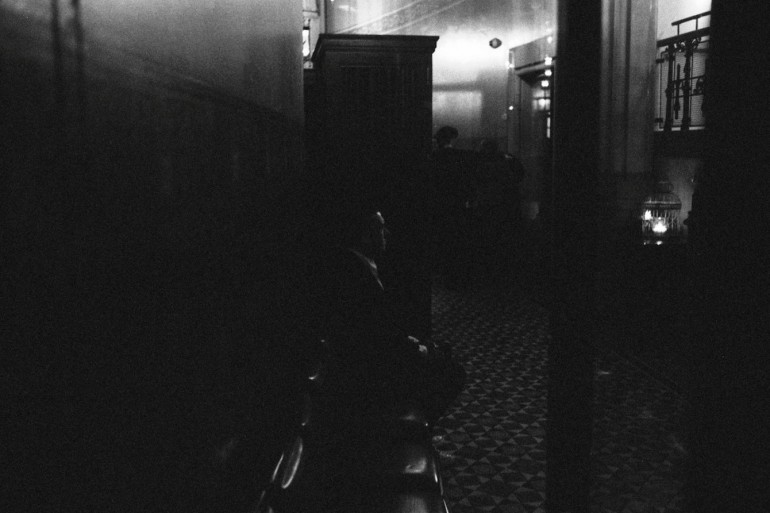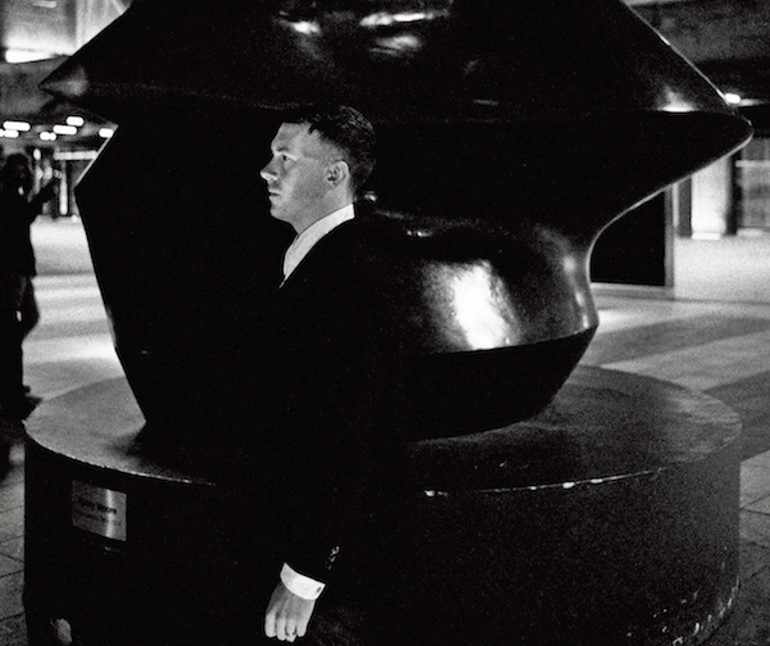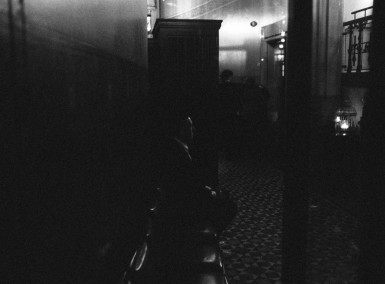
Photo by Todd Hart
There is very little information about KAMERA out there. A quick Google search of Phantasy Sound’s latest signing suggests pictures of German camera equipment, a UK-based magazine for independent cinema and his website, which adds to the mystery by featuring an image of what, presumably, is his logo. Previous pictures reveal more of his surroundings instead of the mystery man himself, who prefers to be covered in a shade of black through an already clouded lens. An ‘established recording artist’ adopting a ‘necessary alias’, KAMERA’s productions combine the ferocity of post-hardcore bands like FUGAZI whilst occupying the same extensive sonic landscapes of SUNN O))) with a tinge of minimal Berlin techno. In tune with the entire hush-hush manner of KAMERA, we caught up with the London-based music maker over the phone. And you can also check out the world premiere of his new tune SR below.
Let’s begin from the beginning. I’ve read you’ve grown up in rural Yorkshire – how did you interest in electronic music begin to manifest? I’ve personally been to smaller towns outside of London; it’s a little difficult to be aware of the different subcultures of electronic music, as you’re not that readily exposed to them on a daily basis as compared to the city…
James: I got into doing that sort of music when I was very young, when I was about nine or ten years old. I used to mess around with tape machines and buy magazines like Future Music and they came with a couple of CDs with samples and stuff. I think that was the first time I gained exposure to producing music and electronic music in general. That was also the starting point for my interest in synthesizers and the whole technology side of music, because I’ve always played the guitar before that. I’ve always tried to record my guitar riffs and I wanted to record some drums as well. Then I picked up a drum machine and got more interested in that than the traditional guitar.
I’ve been chatting to a couple of producers, and some of them do not even have a musical background, like classical theory. Do you think it’s a nature versus nurture?
My family was really into music. My dad was very into blues and San Francisco late 60s, early 70s kind of music. I started playing the guitar when I was seven and having lessons. My guitar teacher got me into different types of music: jazz and the other bits and pieces like contemporary…
I can hear that in your music, like the blues bassline in one of your tracks, like Steely Dan…
Anything with a sort of jangly hook types. Really traditional blues stuff to FUGAZI, post-hardcore, post-punk kind of stuff.
Your first EP sounds like you’ve grown up in the city though, with the industrial influences. How did you gain access to different synthesizers being in that kind of environment and the different subcultures…
A lot of where we were, there was a big techno scene. Something harder and brash. Around the Yorkshire Dales, which is where I’m from, there was a group called the Fabulous 23s, which played acid techno and they would do parties in the woods nearby. It was basically gabber techno. Through that same crowd of people, we were always into the Warp Records stuff like APHEX TWIN Twin and SQUAREPUSHER… When I hear 90s IDM music, I always associate it with the countryside, the middle of nowhere rather than Sheffield, where it was from. That was the main influences really, at that time there wasn’t much urban music from that area. Manchester influence, or Sheffield influence. It wasn’t the hip-hop, R&B sort of thing that London was having at that moment, or Nottingham, where the grime thing tended to come from. When I think about Warp Records kind of stuff I think about parties in the woods, not warehouses or factories in Sheffield.
”The Prodigy Experience’ was a big record for me when I was younger’
How about Leeds?
I was never a fan of dubstep, it bypassed me a bit really. I was into minimal when dubstep was big. Minimal techno. When dubstep was big in Leeds, I was into PAUL WOOLFORD. Most of the dubstep producers that I know are producing techno now.
Did your friends or social groups mainly influence you, and how did that come about?
A lot of my friends are barely into dubstep, except when sub-dub was going. I don’t really know how it was for me. I was always more into techno because of the technology stuff. When I was into minimal I was obsessed with drum machines. My own reference of jungle was from Squarepusher, or the old Tigerbeat tracks, Kid 606, the American stuff. I was more of into the harshness of it than the jungle side of it. Also breaks, even like early PRODIGY. The Prodigy Experience was a big record for me when I was younger. My friend’s brother used to have that record, and I remember hearing loads of older rare records that my friend’s brother used to play. It was inspirational for me to get into this kind of music.
You’ve mentioned your fascination with synthesizers, and how do you manage to organize your own sound especially in this era of abundance? There’s lots going on, so many choices and yet people still can’t do much with production…
Lots of people have problems with making music now is because it’s so accessible. There’s not much room for experimentation. The first track I made was two tape machines, hi-fi, boombox ones, playing from one recording into another and then pausing it, and doing it again, then I had to get another tape machine. The sound quality was horrible but it was an unusual way of doing it and not the ‘right way’ of doing it. The accidents you have would cause you to figure out how to make music, and discover the ‘better’ way to do things. Now you can buy a magazine and it will tell you how to make a deep house track. You can download a template for Ableton or Logic which contains everything you need. People tend to be scared or think it’s wrong to put reverbs on one channel. There’s no wrong way of doing things. There’s loads of brilliant music out there. People ask me for advice on production and engineering and I always say, experiment. Don’t be afraid to do something different.

With the abundance of music technology or even softwares or VSTs, there’s just so much choice and they don’t know how to harness what they really have… It’s hard to realize a concept into fruition…
A lot of it comes from restrictions I had when I first got Protools, like the amount of plugins or tracks that you can have. Most of me making a track back then was to create something and being able to play without stopping because it couldn’t handle it anymore. Now on computers I could have hundreds and hundreds of tracks with a super high bitrate, I still work like that now, by restricting myself and I don’t have things on separate tracks when it obviously is not necessary. I’ll try and keep things tighter and stick to under twenty tracks. Sometimes I’ll turn off the undo function so I can’t undo anything. When Protools was in its early days there were different levels of undo and I could set it to whatever. Now I turn it off and see what happens. Sometimes I would just select samples, have one synth and work with it. It’s easy to get so many plugins and soft synths, hundreds and thousands of presets. You see people on Facebook and Twitter saying, ‘It took me X amount of days to find the right sample…’ and I’m like, you can use the amount of time to find the right kickdrum to do something else.
It’s like these days artists try to broadcast the amount of time and effort they took on making a track, and sometimes they place so much emphasis on the type of equipment that they’re using instead of letting the music speak for itself. It feels a little lofty….
Yeah, definitely. You get all things from the spectrum. You can always tell if somebody’s is trying to be pretentious for the sake of it and when someone’s production style just sounds like that. You can hear the method in the music. It doesn’t sound like an extremely complicated Logic session but the layers and multitracks that were recorded with real instruments.
‘I don’t think we will reach a stage where we’ve heard everything.’
To produce something you need to have a concept, like your EP for example, with its extensive sonic landscapes. I can hear your influences: like the Squarepusher thing and the Berlin techno influence. For example, when DJs play live, you wouldn’t hear those landscapes but in the record. It feels extremely intimate, like you’re communicating directly.
Once you get to a point where you prefer not to experiment and not trying to copy something else too closely… I say it’s fine to have a track you like and try to almost copy it, but you’re never going to do it right. Your wrong version of the track might be your sound. When I started, I always tried to make things like sections of different sounds. You try and do it your way and it sounds nothing like it but it sounds good. Once you get to that when you do have your ‘sound’, things get a bit more cohesive and it’s easier to make an EP or album that makes sense. In hindsight it has a concept, what people like me tend to do with EPs and albums. For the ARC EP, the selection flows quite well and the album art is just spot on.
I can see that, it’s kind of like you don’t want them to have a complete picture of your full intentions with your sound but open to their own interpretation. I feel that dance music nowadays tend to be overtly obvious with everything that’s going on.
One of the great things of working with EROL ALKAN and Phantasy is that they’re very focused on things having that quality and sense of longevity. He’s come from a background similar to me, like a songwriter background where we don’t try to stick a load of random tracks together. It’s something more thoughtful, and that’s exactly what I want to do at this stage.
Do you think that this entire mentality of focus in your work is a sign of the times, like the unstoppable force of dance music is reaching an end of a cycle, or do you think it’s a hiatus where no one knows what’s next?
I think it’s so hard to try and predict what’s going to come, like a colour that you’ve never seen before. I think the lines are going to be more blurred between dance music and electronic music. Things are always going to keep changing and growing, albeit with a bit of nostalgia elements. Disco, and jungle came back a bit, and at the moment, it’s the modular, analogue trend. You’re always going to have that, and it’s going to be mixed in an interesting way. I don’t think we will reach a stage where we’ve heard everything. We haven’t heard every piano concerto yet and its been going on for hundreds of years.
—



